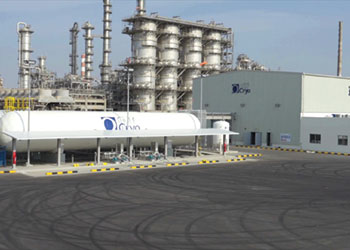
 The Petro Rabigh facility can produce 300 metric tons of liquid CO2 per day
The Petro Rabigh facility can produce 300 metric tons of liquid CO2 per day
Gulf Cryo, a leading provider of industrial, medical, and specialty gases in the region, has opened the first state-of-the-art carbon capture plant dedicated to the merchant market in Saudi Arabia’s Western Region
The plant has been designed and constructed, and will be operated, by Gulf Cryo under a 20-year agreement signed in March 2022 with Petro Rabigh – Saudi Aramco and Sumitomo’s refining and petrochemical joint venture – at the latter’s mono ethylene glycol (MEG) plant located at the Red Sea town of Rabigh, north of Jeddah.
The new facility, which comprises two compressors that combined can produce 300 metric tons of liquid CO2 per day, will help reduce 100,000 metric tons per annum (MTPA) of carbon emissions from the MEG plant.
This represents an 85 per cent reduction in its total annual CO2 emissions footprint and is equivalent to the sequestration capacity of approximately 360,000 mangroves trees over their lifetime.
By preventing the release of CO2 emissions into the atmosphere, the project supports Saudi Arabia's target of net-zero emissions by 2060 under Vision 2030 and aligns with several of the UN Sustainable Development Goals (SDGs).
The captured emissions are delivered through a pipeline to Gulf Cryo’s facility, which is located inside Petro Rabigh’s premises.
It then passes through several processes, such as purification, compression and liquefaction, to reach a food grade standard.
While Petro Rabigh will utilise part of the CO2 stream internally, Gulf Cryo will repurpose the remaining liquid CO2 to many industries, such agriculture, water desalination and mineralisation, food preservation, beverage carbonation, transport cooling, and ready-mix concrete, creating a local circular carbon economy and effectively decarbonising the supply chain of these industries.
 |
The captured emissions are delivered through a pipeline to Gulf Cryo’s facility |
Commenting on the project, Othman Al-Ghamdi, President and CEO of Petro Rabigh, says: 'Taking meaningful action to cut our carbon footprint is a strategic priority for Petro Rabigh. Through this pioneering initiative under our strategic partnership, we are demonstrating an unwavering commitment to significantly reducing emissions over the long term. This directly supports the Kingdom's ambition to achieve net zero emissions by 2060.'
On his part, Abdul Salam Al Mazro, Vice Chairman of Gulf Cryo, says: 'This landmark project anchors our leading position in CCUS solutions in the region and marks our first carbon capture project in the Kingdom. It underscores the importance of managing the full CO2 value chain; we reduce emissions at source while utilising the recovered CO2 as a vital resource to help decarbonise supply chains of various industries.'
He adds: 'Working alongside Petro Rabigh is a real pleasure and demonstrates a successful partnership and a joint commitment to environmental stewardship. We look forward to celebrating continuous successes together.'
GULF CRYO'S GROWTH VISION
 |
The captured emissions are delivered through a pipeline to Gulf Cryo’s facility |
In 2022, Gulf Cryo made significant strides in carbon capture by signing two strategic agreements in Saudi Arabia. The first agreement was with Petro Rabigh – inaugurated now – while the second was with mining company Ma’aden, which is due to open in 2024.
The Ma’aden investment project, which includes a new mega CO2 capture plant and a large air separation plant, is on schedule and expected to be operational by mid-2024. The plants are currently being constructed in Europe and installation will start early 2024.
Both these plants will triple the company’s carbon capture capacity to 300,000 MT per annum by 2024, while it will reach more than 500,000 MTPA of CO2 by 2030, all in line with the regional and global climate goals.
Furthermore, Gulf Cryo is the first gas supplier investing in the Ras Al Khair industrial cluster, having signed a 20-year supply contract with International Maritime Industries (IMI) – the anchor investment within King Salman Complex for Maritime Industries – by installing a gas storage and supply hub. The CO2 captured at Ma’aden plant will be reused at IMI for the shipyard’s operational requirements.
To add to this, Gulf Cryo is developing the first Technology and Application Centre at the King Salman Energy Park (Spark).
The centre will focus on new technologies for carbon capture and explore opportunities for clean CO2 utilisation in various industries, including food and beverages, oil and gas, agriculture, building materials, etc.
Gulf Cryo had adopted the green agenda in its strategy at a very early stage and took the risk to invest in the first carbon capture plant in Kuwait in 2014.
The company is expanding both production volumes and offerings; volumes through the new carbon capture plants, and offerings by creating innovative utilisation for the abundant CO2 in the atmosphere.
It is building capacities well ahead of demand and the new production plants will be modular, enabling agility in increasing the volumes of carbon capture within a very short period and with low additional investments.
With a focus on the Middle East Region, Gulf Cryo has announced new and large production plants in Saudi Arabia, the UAE and Kuwait, targeting localisation and sustainable supply chains.
To address seasonality, Gulf Cryo is strategically locating additional CO2 production plants close to end users and in potential growing regions across the Middle East. It builds and large storage/distribution hubs and engages the biggest distribution fleet.
By Abdulaziz Khattak






































































